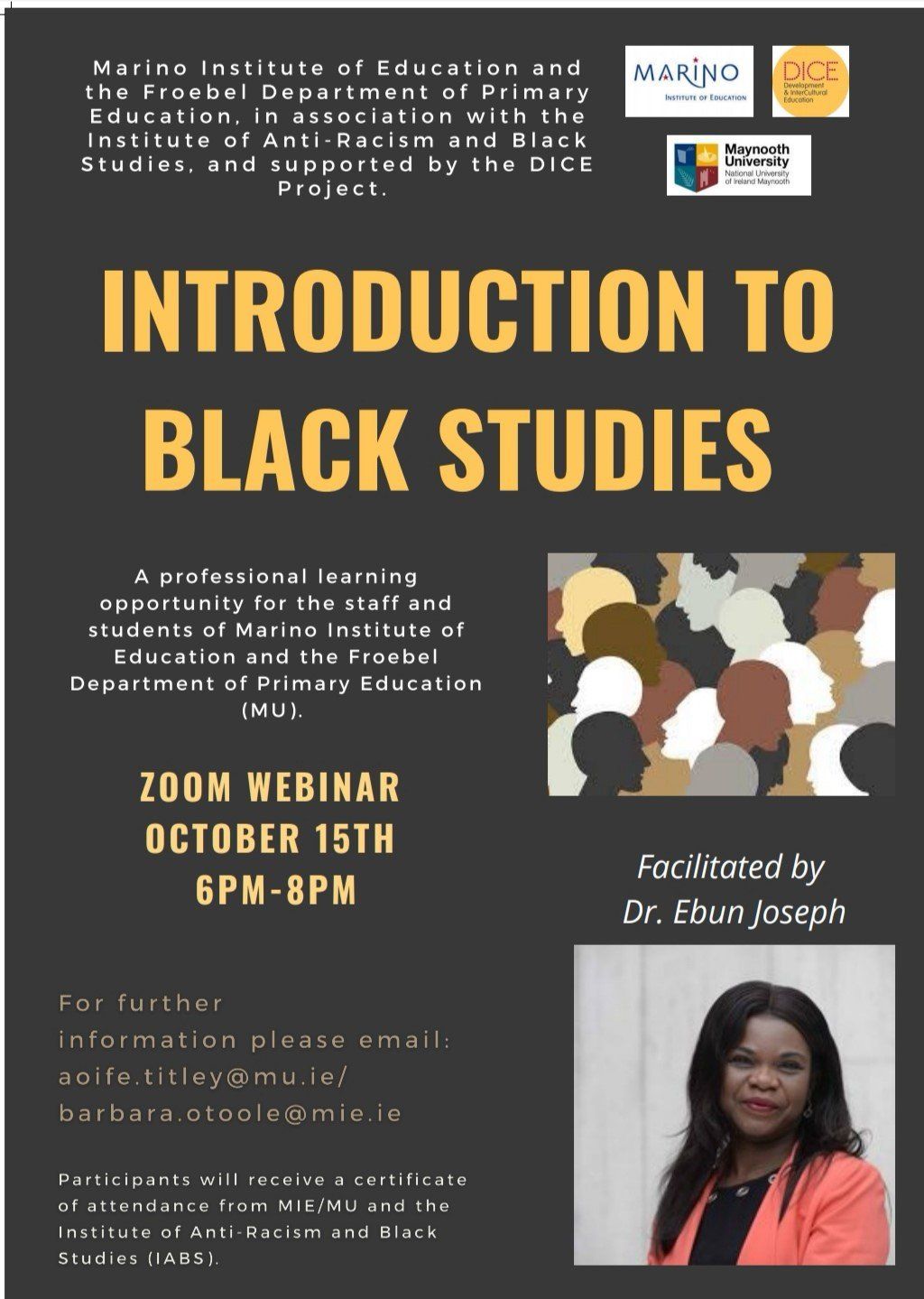The DICE project is a national strategic educational initiative implemented by Dublin City University Institute of Education, Mary Immaculate College, Marino Institute of Education and the Froebel Department in Maynooth University. The DICE project aims to embed development education and intercultural education as essential elements of initial teacher education at primary level in Ireland.
In October 2020, DICE supported Marino and Froebel to run a webinar entitled ‘Introduction to Black Studies’. Featuring six speakers from the Black diaspora, the webinar aimed to counter Eurocentric historical narratives of Black experiences and to explore contemporary forms of Blackness. The webinar also challenged social hierarchies and addressed pervasive stereotypes relating to the continent of Africa.
Over 130 students and staff took part in the webinar. This is a very high attendance rate and suggests that DICE’s offering was well attuned to learning needs and interests. Feedback from participants was captured via an online survey that was sent out immediately after the webinar. The survey responses illustrate impact across a range of learning areas, including knowledge, confidence, attitudes, and behaviour. One participant stated, ‘The issues explored are far-reaching and complex…In the past, this would have deterred me from teaching them to the same extent I now have the confidence and competence for.’ The comments revealed an interweaving of personal and professional development. For example, one participant wrote: ‘Personally when I am having a conversation about racism, I know I am sometimes scared of saying the wrong thing or not phrasing something in the best way, but I think it is important that we use this to educate ourselves more and I want to feel confident to discuss these topics in my future classroom.’
To supplement the survey responses with in-depth qualitative data, DICE invited one participant to contribute a student narrative about the webinar. DICE selected a student in fourth year, because she had teaching practice experience and therefore was in a good position to see how the webinar could improve her classroom practice. The student’s narrative identified how her own perspectives changed through the webinar’s provision of a ‘powerful lens’ to look at Black issues. She also noted that the webinar provided her with ideas for integrating African contributions into the primary curriculum, for example using the Egyptian pyramids as an example in science and technology. Most significantly, the webinar gave her the confidence and inspiration to learn more. She stated, ‘We are all responsible and in a position to inform ourselves and educate others on Black Studies.’
The post-webinar feedback enabled DICE to provide effective follow-ups, and to learn lessons for future interventions. One important lesson was that students really appreciated the six separate inputs, rather than listening to one generalised presentation. The six topics helped students to identify specific entry points across the primary curriculum, for example, language, music, visual arts and science. This was especially helpful for the third year cohort who would have time to reflect, learn and prepare before they went out on teaching practice.
The guest speakers provided stimulating references for further learning, for example on the history of Black people in Ireland. In addition, DICE invited a number of the guest speakers to make short videos for DICE’s YouTube channel. These videos reinforced learning for those who attended the webinar, whilst providing information for students who had not been able to attend the original session.
DICE followed up the webinar with a series of three practical workshops on teaching about race. The workshops were offered in May 2021. The workshop series was limited to 70 students and was booked out immediately. This suggests that the original webinar had a positive impact on students and that they were keen to learn more, especially in terms of how to apply their learning to their future classroom practice. DICE believes that the sequence of the interventions increased their impact---firstly, a challenging issue was introduced via a webinar; secondly, follow-up reading/viewing was suggested; and thirdly, a series of workshops provided practical support for teaching about the issue. DICE plans to organises these events again in the 2021/22 academic year.
In terms of longer-term impact, anecdotal evidence suggests that some participants went on to choose a related topic for their fourth-year research project. This should not be viewed in terms of ‘cause-and-effect’, but rather that the DICE interventions may have encouraged interested students to pursue the topic, as well as assuring them that there was plenty of rich material that they could access for their research.
On an even longer-term scale, impact could continue after students complete their degree and embark upon their first years of teaching. There is the possibility that newly-qualified teachers who are confident in teaching about Black Studies would have a multiplier effect on other teachers in their schools. DICE acknowledges that tracking longitudinal change is very demanding of time and resources. However, a small-scale study tracking a limited number of students across certain DICE interventions would have the potential to yield valuable data for DICE, the partner institutions and the DE sector overall.
Image:
- Flyer for Introduction to Black Studies Webinar. (main page and picture 1)
Credit: The DICE Project







